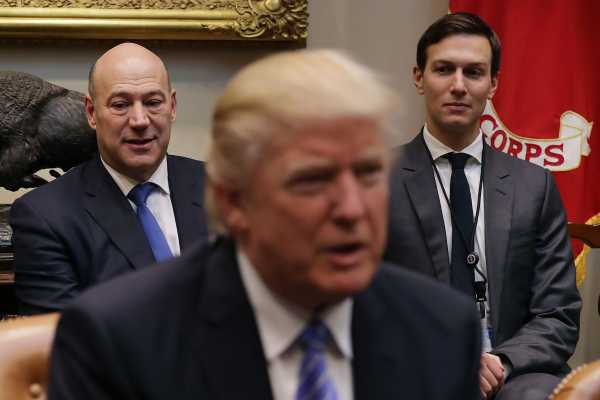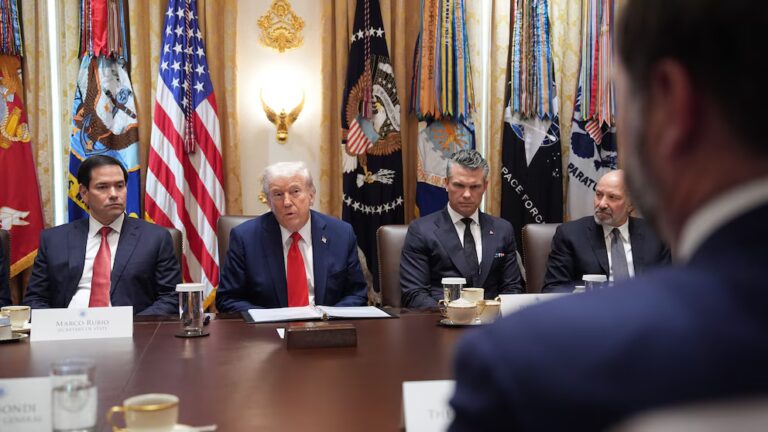
Gary Cohn, the head of President Trump’s National Economic Council, is leaving. “I am grateful to the President for giving me this opportunity and wish him and the Administration great success in the future,” Cohn said in a statement. A few thoughts:
1) Cohn’s exit is believed to reflect two realities. First, he accomplished most of what he actually wanted to accomplish in the position — namely, massive tax cuts for corporations and wealthy Americans (such as Cohn, a former top executive at Goldman Sachs). Second, he was uncomfortable with the direction Trump is going on tariffs.
2) Cohn is known to have nearly, but not actually, quit after Trump’s comments on August’s white nationalist march in Charlottesville, Virginia. The fact that he is instead quitting now has led to a lot of criticism to the effect of, “Charlottesville was acceptable, but tariffs were the last straw!” This is true, so far as it goes. But it goes too far. By that logic, the entirety of the Trump administration should quit, and as noxious as Trump’s comments were (and are), we actually need some people staffing the executive branch. Cohn’s exit is, in its way, normal: He passed his signature policy effort, he didn’t get the promotion to Federal Reserve chair, he was losing influence internally, he was burnt out, and so he is leaving.
3) What’s abnormal is that Cohn’s deputy, Jeremy Katz, left in December. Usually the deputies wait out the bosses so they can become the bosses. But the Trump administration isn’t building its bench. It’s losing its bench even faster than it’s losing its principals. Trump’s White House has also lost the deputy directors of the National Security Council and the Domestic Policy Council, as well as multiple deputy chiefs of staff. Oh, and last week, Trump’s communications director and deputy communications director resigned.
4) If all this feels like a lot of turnover, it’s because it is a lot of turnover. An unprecedented amount of turnover, in fact. As the New York Times’s Peter Baker wrote in an article published February 12, using data compiled by the Brookings Institution, “Trump’s 34 percent turnover rate in his first year is more than three times as high as President Barack Obama’s in the same period and twice as high as President Ronald Reagan’s, which until now was the modern record-holder.” And that was before these most recent departures.
5) Much of the blame here properly attaches to Trump, who is a difficult and disloyal boss who doesn’t listen when you brief him, doesn’t read the documents you prepare for him, and can’t correctly remember what you’ve told him. And if you anger him, he will turn on you in a meeting or, worse, in public. No one wants to end up like Steve Bannon or Jeff Sessions. And none of this is a secret to the men and women who might be next in line for these jobs.
6) Then there’s the deeper problem that Trump is uninterested in core questions of governance and has never resolved the ideological tensions in his administration. Cohn was seen as the leader of the administration “globalist” wing and his exit led White House officials to text Axios’s Jonathan Swan emojis of a globe going up in flames. Lovely workplace culture they’ve got going on there.
7) Among the leading candidates to replace Cohn are reportedly Peter Navarro, the hardline protectionist who leads the White House National Trade Council, and Larry Kudlow, the hardline supply-sider who hosted a show on CNBC. As CNBC’s Eamon Javers notes, these two men have opposite views on trade — and the fact that they could both be considered as Trump’s top economic adviser reflects just how little interest the president has in settling the internal wars that have left his administration with so much infighting and leaking.
8) During the campaign, Trump repeatedly promised to “hire the best people.” But the best people want to work for the best bosses, in the best organizations, supported by the best cultures. Trump hasn’t created anything of the kind. A year into his presidency, the bar for Trump administration staffing has been lowered. Forget the best people. It’s an open question whether he can even attract qualified people.
9) The arcs of top staffers like Cohn and Sessions and Reince Priebus and Rex Tillerson, who joined early on in the hopes that the Trump administration would be normal, or could be made normal, have shown everyone else that to work in the Trump administration is to court reputational ruin, legal risk, and public humiliation. Why would top candidates sign up for that?
Sourse: vox.com






